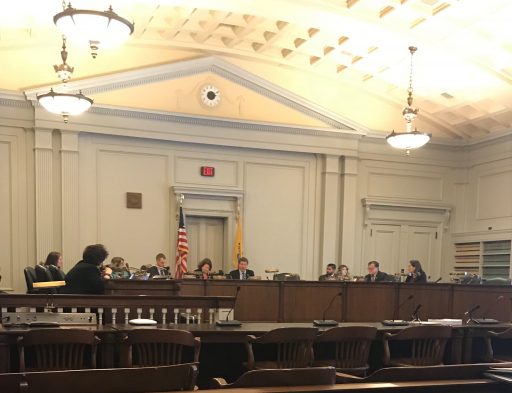
On Monday, Jan. 8, members of the Joint Legislative Task Force on Drinking Water Infrastructure voted unanimously to adopt the findings and recommendations in its report. The task force’s two Republican members noted that they will also issue a minority report, with specific suggestions for ways to focus a state investment program. The Drinking Water Task Force’s final report comes more than a year after the task force was formed, initially to examine the problem of lead in water lines in many of the state’s public schools. Its recommendations aligns closely with the priority solutions to the state’s water-infrastructure crisis that Jersey Water Works has identified — particularly with the recommendations for robust asset management and for increased funding. Among the report’s recommendations:
- Asset management, to be incentivized by matching grants from the state Environmental Infrastructure Financing Program for upgrade investments, which would be made to utilities with robust asset management programs in place;
- Capacity-building for smaller utilities, to be provided via grants and technical assistance from the New Jersey Environmental Infrastructure Trust;
- Increased funding for replacement of lead pipes and mitigation of combined-sewer overflows;
- More stringent requirements for accountability and transparency, including requiring standardized metrics to be reported.
The 30-page report also addresses water loss, affordability, lead in drinking water, stormwater and CSOs, and the statewide water supply plan. Two sections describe the issues specific to investor-owned utilities and publicly owned municipal utilities and utilities authorities.
The scale of the recommendations is a testament to the broad range of members who provided testimony to the task force at its first hearing, highlighting everything from the history and scope of the problem to the benefits to utilities, the environment and the larger economy of robust asset management to the need for better and more standardized data and better accountability to the importance of managing drinking water as one component of a holistic system. At the second hearing Jersey Water Works members from the New Jersey Department of Environmental Protection and the New Jersey Environmental Infrastructure Trust described how their agencies are responding to drinking water issues. Additional Jersey Water Works members testified at the final hearing in January 2017, which focused on lead in drinking water.
News coverage:
- Panel recommends $400M bond issue to shore up New Jersey’s water infrastructure (NJ Spotlight)
- NJ Legislature Weighs In on Clean Water: Governor Is Up Next (NRDC Blog Post)
- Recommendations to Invest $400M to Start Improving H20 Infrastructure (Joint statement in Insider NJ by Sen. Greenstein and Asm. McKeon)
- NJ encouraged to borrow $400M for water infrastructure (NJ 101.5)
- Task force recommends voter referendum to improve water infrastructure (NJTV News)
- Report urges major investment in NJ’s aging, leaky drinking water pipes (The Record)
Perhaps because the danger of lead in school drinking water was the impetus for establishing the task force, the media has given the issue larger coverage than often accompanies policy decisions on invisible infrastructure — a testament to collaborative members’ ability to underscore the importance of the issue to all New Jersey residents. Both the recommendations and the media coverage of the task force are a testament to the power of the Jersey Water Works collaborative to educate and inform all affected stakeholders — including legislators and members of the public — on the importance of taking action on a critical but little-considered issue. The report concludes with a call to action: “The task force urges the Legislature, the Governor, local governments and water utilities to continue to work together and with stakeholders, such as the Jersey Water Works collaborative, to discuss and implement the recommendations in this report.”
“This report is an important first step,” said Jane Kenny, Jersey Water Works co-chair. “We look forward to working with the Legislature and the Murphy administration to elevate the the importance of this issue and promote critical upgrades to our water infrastructure.”
